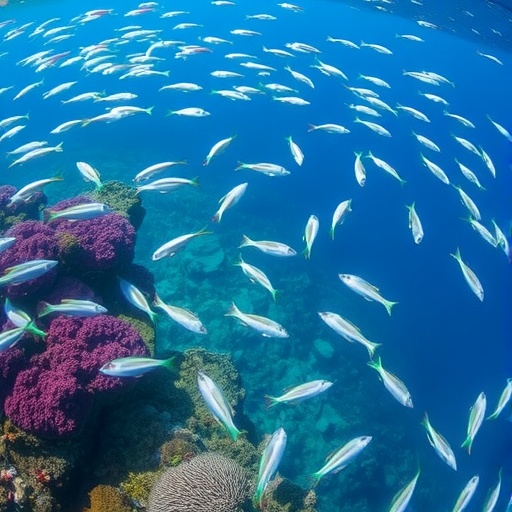Coral reefs, one of the most biologically diverse ecosystems on the planet, serve as a crucial lifeline for coastal communities around the globe. Recent research conducted by prominent marine ecologists T.R. McClanahan and J.K. Kosgei highlights the considerable variation in coral reef fisheries production and its implications for employment and living wage standards. This comprehensive study, published in the journal Coral Reefs, delves into the multifaceted relationships between sustainable fisheries management and the socioeconomic well-being of communities dependent on these vital marine resources.
The research underscores that the productivity of coral reef fisheries is not only an environmental issue but also a pressing socioeconomic concern. With millions of people relying on these fisheries for their livelihoods, the study reveals alarming discrepancies in production levels across different geographic regions and fishing practices. McClanahan and Kosgei’s analysis sheds light on the importance of understanding these variances, which can ultimately inform better fisheries management practices and policies.
In their exploration of coral reef fisheries, the authors dissect the factors influencing fish stocks, including overfishing, climate change, and habitat degradation. They present compelling data that illustrates how human activity has bent the natural productivity of these ecosystems, often leading to diminished fish populations and, consequently, reduced catch. This depletion impacts not only the environment but also the food security and economic stability of communities whose livelihoods are intricately linked to these underwater ecosystems.
The authors emphasize the urgency of addressing these challenges, particularly in regions where reef fisheries are critical for subsistence and income generation. By employing advanced methodologies and employing a comparative lens, McClanahan and Kosgei provide a valuable framework for examining fisheries production and its impact on community employment. They identify patterns that indicate where sustainable practices could help in boosting production and ensuring that local fishers receive a living wage.
As they explore the links between fisheries production and economic outcomes, the researchers advocate for a paradigm shift in how fish stocks are managed. Traditional models that prioritize immediate economic gains often overlook the long-term sustainability of both fisheries and the communities they serve. The findings suggest that holistic approaches, which incorporate ecological health and socioeconomic factors, could enhance both fish populations and the livelihoods of those who rely on them.
Furthermore, the study addresses the discrepancies in living wage goals across various regions dependent on coral reef fisheries. McClanahan and Kosgei found that in some areas, socio-economic targets are not aligned with the realities of fishing productivity, resulting in systematic inequalities. By highlighting these issues, the research advocates for policy revisions that reflect the true value of healthy ecosystems and fair compensation for those involved in the fishing industry.
Local governments and stakeholders are encouraged to engage in dialogue aimed at revising policies and frameworks that govern fishing practices. The authors suggest that community involvement and awareness must be prioritized in these discussions, promoting a sense of ownership among local fishers and ensuring that their voices are heard. Sustainable fishing practices are only achievable if the communities affected have a stake in their development and implementation.
McClanahan and Kosgei also reflect on the role of technology and innovation in enhancing coral reef fisheries management. They posit that integrating advanced technologies such as satellite monitoring, data analytics, and community-based management systems can lead to more effective regulatory measures. These innovations can help ensure that fish stocks are maintained at sustainable levels while providing necessary data that can inform long-term economic strategies.
In recounting global case studies, the authors compare regions with varying degrees of success in implementing sustainable fisheries. These stories serve as powerful examples, illustrating the consequences of neglecting ecological considerations against those that have achieved a balance between ecology and economy. Their findings serve as a clarion call for international cooperation and knowledge sharing, urging countries to learn from one another in their quests for sustainability.
As the issue of climate change looms larger, impacting ocean temperatures and acidification, it becomes increasingly vital for fisheries management to adapt. McClanahan and Kosgei’s research reflects a growing consensus that addressing climate-related challenges is essential for the future viability of coral reef fisheries. They advocate for proactive strategies that incorporate climate resilience into fisheries management plans.
Ultimately, the study reveals that coral reef fisheries are a microcosm of broader environmental and socio-economic challenges faced globally. By examining the interdependencies of ecological health, economic security, and community stability, McClanahan and Kosgei highlight the complexities of sustainable development in marine contexts. Their research is not just an academic contribution but a necessary discourse that seeks actionable solutions for the communities that rely on these vibrant ecosystems.
In conclusion, the collaborative efforts presented in this research are vital for ensuring both the health of coral reef ecosystems and the prosperity of the communities that depend on them. As stakeholders and policymakers take heed of these findings, they hold the potential to foster more sustainable fisheries practices that can endure the challenges of the 21st century. The implications of McClanahan and Kosgei’s work extend beyond academia, calling for an urgent re-evaluation of how we perceive, manage, and protect our coral reef fisheries for generations to come.
By reflecting on this research, we are reminded of the need to view our oceans not merely as resources to be exploited but as living systems that sustain life, culture, and community. Each fish caught represents not just an economic transaction but a thread in the larger tapestry of human existence across the globe. As we look to the future, the hope is that through informed practices and collaborative management, we can preserve our underwater treasures for future generations.
Subject of Research: Coral reef fisheries production, employment, and living wage goals.
Article Title: Variation in coral reef fisheries production, employment, and living wage goals.
Article References:
McClanahan, T.R., Kosgei, J.K. Variation in coral reef fisheries production, employment, and living wage goals.
Coral Reefs (2025). https://doi.org/10.1007/s00338-025-02779-7
Image Credits: AI Generated
DOI: https://doi.org/10.1007/s00338-025-02779-7
Keywords: Coral reefs, fisheries management, socio-economic challenges, sustainable practices, climate change, community involvement, technological innovation, policy reform.




